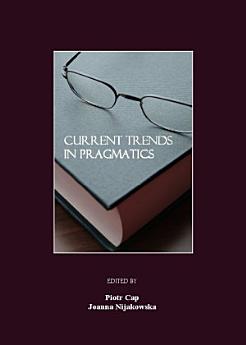Current Trends in Pragmatics
Piotr Cap · Joanna Nijakowska
ମାର୍ଚ୍ଚ 2009 · Cambridge Scholars Publishing
5.0star
1ଟି ସମୀକ୍ଷାreport
ଇବୁକ୍
430
ପୃଷ୍ଠାଗୁଡ଼ିକ
family_home
ଯୋଗ୍ୟ
info
reportରେଟିଂ ଓ ସମୀକ୍ଷାଗୁଡ଼ିକୁ ଯାଞ୍ଚ କରାଯାଇନାହିଁ ଅଧିକ ଜାଣନ୍ତୁ
ଏହି ଇବୁକ୍ ବିଷୟରେ
The volume brings together twenty articles written by established linguists, language philosophers, sociologists and psychologists, sharing their academic interest in a broad and interdisciplinary field of linguistic pragmatics. The collection consists of four thematic parts: “Pragmatics and Cognition,” “The Semantics-Pragmatics Interface,” “Conversational and Text Analysis” and “Pragmatics, Social Research and Didactics.” It aims to contribute to the debate on the present-day status of pragmatics, by examining three fundamental issues. The first involves the question of the current explanatory power of pragmatics, namely, how successful is the existing apparatus of pragmatics and the basic-level parameters (theories of speech acts, relevance, implicature, presupposition, deixis, politeness, etc.) in the elucidation of various aspects of meaning. The second issue involves the methodological assistance that pragmatics might need in order to enhance its explanatory power. The third has to do with the fuzzily defined boundaries of the discipline of pragmatics and the resulting temptation for analysts to concentrate solely on its fragmented sub-domains. As the collection unfolds, these issues form a continuum which, it seems, is often a process that a linguist goes through as his or her methodological awareness deepens. Thus, the orientation of the volume towards the analyst and the analytic mind-set, as well as the attempted balance in presentation of the alternative approaches, seem the major theoretical characteristic of the book.
ମୂଲ୍ୟାଙ୍କନ ଓ ସମୀକ୍ଷା
5.0
1ଟି ସମୀକ୍ଷା
ଲେଖକଙ୍କ ବିଷୟରେ
Piotr Cap is Associate Professor and Head of the Department of Pragmatics at the University of Łódź, Poland. He has been research fellow at UC Berkeley, Birmingham University, the University of Munich and Boston University. His interests are in pragmatics, political discourse and methodology of linguistics. His book publications include Explorations in Political Discourse (Lang, 2002), Pragmatics Today (Lang, 2005) and Legitimization in Political Discourse (CSP, 2006). He is editor of the international journal Lodz Papers in Pragmatics (LPP).
Joanna Nijakowska is Assistant Professor in the Department of Psycholinguistics and Language Didactics at the University of Łódź, Poland. She specializes in the psychological, neurolinguistic and pragmatic aspects of language comprehension and processing. She has lectured at several European academic centers, including the University of Tampere, the University of York and Manchester University.
ଏହି ଇବୁକ୍କୁ ମୂଲ୍ୟାଙ୍କନ କରନ୍ତୁ
ଆପଣ କଣ ଭାବୁଛନ୍ତି ତାହା ଆମକୁ ଜଣାନ୍ତୁ।
ପଢ଼ିବା ପାଇଁ ତଥ୍ୟ
ସ୍ମାର୍ଟଫୋନ ଓ ଟାବଲେଟ
Google Play Books ଆପ୍କୁ, Android ଓ iPad/iPhone ପାଇଁ ଇନଷ୍ଟଲ୍ କରନ୍ତୁ। ଏହା ସ୍ଵଚାଳିତ ଭାବେ ଆପଣଙ୍କ ଆକାଉଣ୍ଟରେ ସିଙ୍କ ହୋଇଯିବ ଏବଂ ଆପଣ ଯେଉଁଠି ଥାଆନ୍ତୁ ନା କାହିଁକି ଆନଲାଇନ୍ କିମ୍ବା ଅଫଲାଇନ୍ରେ ପଢ଼ିବା ପାଇଁ ଅନୁମତି ଦେବ।
ଲାପଟପ ଓ କମ୍ପ୍ୟୁଟର
ନିଜର କମ୍ପ୍ୟୁଟର୍ରେ ଥିବା ୱେବ୍ ବ୍ରାଉଜର୍କୁ ବ୍ୟବହାର କରି Google Playରୁ କିଣିଥିବା ଅଡିଓବୁକ୍କୁ ଆପଣ ଶୁଣିପାରିବେ।
ଇ-ରିଡର୍ ଓ ଅନ୍ୟ ଡିଭାଇସ୍ଗୁଡ଼ିକ
Kobo eReaders ପରି e-ink ଡିଭାଇସଗୁଡ଼ିକରେ ପଢ଼ିବା ପାଇଁ, ଆପଣଙ୍କୁ ଏକ ଫାଇଲ ଡାଉନଲୋଡ କରି ଏହାକୁ ଆପଣଙ୍କ ଡିଭାଇସକୁ ଟ୍ରାନ୍ସଫର କରିବାକୁ ହେବ। ସମର୍ଥିତ eReadersକୁ ଫାଇଲଗୁଡ଼ିକ ଟ୍ରାନ୍ସଫର କରିବା ପାଇଁ ସହାୟତା କେନ୍ଦ୍ରରେ ଥିବା ସବିଶେଷ ନିର୍ଦ୍ଦେଶାବଳୀକୁ ଅନୁସରଣ କରନ୍ତୁ।







